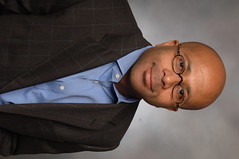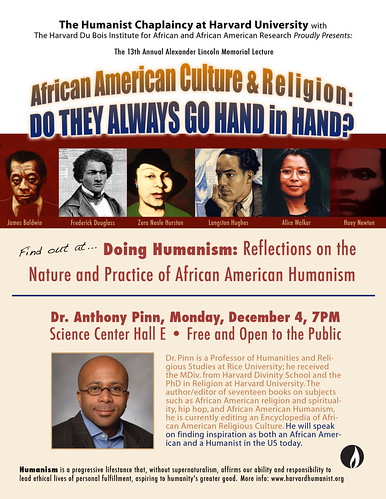2006 Lincoln Lecture: African American Humanism December 4, 2006
Cambridge, Massachusetts 02138
African Americans tend to be thought of as among the most "religious" groups in American society. But especially given recent debates on religion's role in science, politics, terror, and more, it seems the time may have come to ask: is there room for a Humanistic, agnostic or atheistic form of spirituality in African American life and culture? One of the nation's leading young scholars of African American Religion, Dr. Anthony Pinn, passionately believes not only that African American Humanism can thrive today, but that it has been developing for well over a century. Pinn, a Harvard and Columbia-trained professor at Rice University, in his mid-forties, is the author/editor of seventeen books, on subjects such as African American religion and spirituality, hip hop, and African American Humanism; he is currently editing an Encyclopedia of African American Religious Culture.

Pinn points out that, since the time of slavery, American Blacks have been critiquing the Christian narrative that suffering is redemptive and should therefore be accepted and not struggled against. Many have even left behind belief in God altogether in favor of a human-centered focus on earthly reason and compassion. This Humanist alternative in African American spiritual life traces its roots to the religious questioning of thinkers such as Frederick Douglas and W.E.B. Du Bois, the agnosticism of James Baldwin, the socialist-influenced irreligion of Huey Newton and Langston Hughes, and the full-fledged modern Humanism of Zora Neale Hurston and Alice Walker (Walker was even the recipient of the prestigious American Humanist of the Year award in 1997).
Invited by the Humanist Chaplaincy at Harvard University (and co-sponsored by the Harvard Du Bois Institute for African and African American Research), Pinn will deliver the 13th Annual Alexander Lincoln Lecture, entitled, "Doing Humanism: reflections on the Nature and Practice of African American Humanism." He will reflect on questions such as, what should African American Humanism "look like" on a practical level? And how can 21st-century African Americans look to provide meaningful concrete alternatives to the liturgy, community, ritual, and social identity of the Black Church and other traditionally religious groups?
The Lincoln Lectureship has been an informal 'Harvard Humanist of the Year' award, given in previous years to notable figures ranging from the great scientist E.O. Wilson, to Human Rights heroes Taslima Nasreen and General Romeo Dallaire.

For Pinn's Profile on the Humanist Chaplaincy at Harvard website:
http://www.harvardhumanist.org/?page_id=36
To get involved, send email to [email protected] with the subject header, African American Humanism.
Official Website: http://harvardhumanist.org
Added by humanist on September 8, 2006